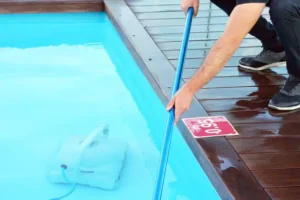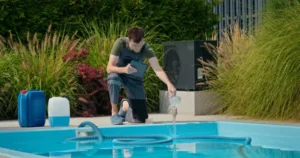Hot Pool Cleaners Get Dirty
A clean pool is the only way to ensure a safe and enjoy able swimming experience. While the best pool cleaners may be able to handle dirt build-up over time, it can ultimately cause a decrease in their capability and require more frequent maintenance. In this post, we will discuss why hot pool cleaners become dirty and what the proper ways to maintain them are.
What are hot pool cleaners?
We are about to get into the dirt here, pardon me and let us just state cloudly what is a hot pool cleaner. A hot pool cleaner is also a specialized device that aims to clean swimming pools through the use of heated water. They successfully scatter garbage, soil and green growth from the face of pool which causes your swimming zone to shiningly clean. The cleaners come in robotic, suction and pressure-driven modes which uses heat to boost the cleaning power.
Conclusion Knowing the hot pool cleaner types is important in choosing a suitable to use for your pools. While robotic cleaners can move around your pool on their own, suction-side models rely on the existing filtration system of your pool. Pressure cleaners -these utilise water pressure from your pool pump to blast away dirt and debris. Both types have their own pros, can be used in a different pool situations.
Why Do Hot Pool Cleaners Get Dirty?

This is why the hot pool cleaners tend to gather so much filth. By being aware of them, you can use it more carefully and keep your cleaner working for longer.
Frequent Use
Over time using your poor often debris such as leaves, dirt and small insects can accumulate in the cleaner. This build-up can clog filters, and cause the cleaning process to be less effective. Since we always ensure that it functions effectively and does its job of cleaning our carpets well, this will help reduce the amount of grime buildup.
Poor Water Chemistry
You need to keep your pool clean from time to time and having the right water chemistry is important. Unbalanced pH glucose levels is a few issues can that bring about there being algae development and the pool cleaner will find it too difficult clean this up. Over time, algae will build up inn your cleaner and you will notice that the water chemistry is off as well. Regular chemical testing and adjustments of pH, alkalinity, chlorine levels are critical as algae love warm water that is imbalanced.
Inadequate Cleaning Schedule
Dirty Cleaner (Clean your pool, and off-course cleaner as well) Dirt […] Having a regular cleaning plan in place can help limit large amounts of dirt collecting, and maintain the efficiency of your pool cleaner. Itself for obvious reasons, this topic is broad and its maintenance checklist would take up an entire blog post of we were to outline all the weekly & monthly tasks one could do here so creating a general list will greatly simplify it.
Filter Issues
A pool cleaner is only as good as its filter; in this, lies the magic of an auto-vacuum. A clogged or dirty filter cannot effectively trap the debris. This action makes the cleaner work harder and creates more dust to get into its internals. Filters should be checked and changed as needed in order to avoid dirtiness.
Lack of Proper Maintenance
As with other equipment, hot pool cleaners also require regular maintenance. If these brushs, tracks or wheels are not clean enough they will dirt and debris. This maintenance routine is just the basic in order to enhance a long life for your new vacuum cleaner. Including that monthly “deep clean” would go a long way to making your cleaner more durable.
Environmental Factors
The leaves, pollen and dust from your environment can all blow into the pool. Your cleaner will use more energy to clean, if it is near trees or plants which can shed organic debris. Skimming the surface of your pool to remove debris will also help alleviate some chores from the cleaner.
Water Temperature
While heated water can be great for cleaning purposes, it also helps to contribute others. Warm pool water could help algae grow This is especially the case in sunbelt regions or during summer when water temperatures are high. The same goes for your pool cleaner: the integrity and cleanliness of its job will be protected by holding that water at an even temperature.
Type of Debris
Pools of varying types can have an impact on the dirtiness levels right this second onto your hoover. Smaller particles of dust or sand are going to settle in the filter, and large debris (ex, leaves and twigs) can get clogged within: thus leaving you with an issue that is even worse than where you started from. Knowing what kind of debris your pool attracts can help to keep you ahead of the cleaning cycle, as well in knowing where or not make maintenance adjustments.
Tips for Maintaining Your Hot Pool Cleaner

Now that we know why hot pool cleaners get dirty, here are a few maintenance hacks to ensure your cleaner stays clean and operates perfectly.
Regular Cleaning
Add in that you clean the pool cleaner every two weeks. Remove any big items caught in the brushes or wheels and rinse your cleaner with a garden hose to get rid of smaller particles. Doing this will help keep the cleaner in better condition and prolong its life. Invest in a cleaning kit that is similar to your cleaner type.
Monitor Water Chemistry
You should test your pool water at least once weekly to make sure it has the correct balance of ph, alkalinity and chlorine. This will stop algae and so on which can make a mess out of your cleaner. By taking quick action with any imbalances, you can considerably reduce the cleaning power of your pool.
Inspect and Clean Filters
Inspect the filters at least once a month for blockages or debris accumulation. As needed, clean them and replace to keep performance at peak levels. Some filters may be accessible by turning an easy to remove the cap or module. Having a backup of filters will enable you to fix problems right away.
Professional Maintenance Scheduling

Get your pool and its equipment serviced by a pro at least once per year Having this service performed can find problems before they develop into major issues and get your pool cleaner working just the way it should. A professional also will give you tips to improve your maintenance routine as well.
Cover Your Pool
So, by using a pool cover also when the swimming pool is not in use you can prevent some debris from getting into it. This will lower the strain on your pool cleaner to keep it clean for longer. Find one that are covers very tight so it could avoid blowing away the leaves or grime.
Educate Yourself
Learn How to Best Take Care of Your Hot Pool Cleaner Read the manual, maybe consult online forums and local community groups to get knowledge of other pool owners. Troubleshooting tips, product recommendations from different online resources.
Invest in Quality Equipment
High-quality pool cleaners make maintenance move smoother when you choose something that works best for what your specific situation is. Look into different manufactures brands and models to see what is reliable. This will ensure a cleaner operates more efficiently as well and with less maintenance throughout the course of its life.
Create a Maintenance Log
Log maintenance: notes on when the filter was cleaned, water chemistry tested and cleaner itself. This can be useful for you to schedule and not forget any of the major tasks. Before long, you’ll see trends emerge that could help inform a more optimal approach to your maintenance schedules.
Frequently asked questions
How Often Should I Clean My Hot Pool Cleaner?
Your pool cleaner should be cleaned every two weeks. Cleaning is something that must be done on a routine basis to control dirt advertisements and make sure it works the manner it should.
How do I understand when my collection cleaner is dirty?
When your cleaner is not picking up debris well, leaving dirt behind or if there are visible build-ups on its components.
Is it safe to use the pool cleaner while IN my swimming pool?
Today, for the most part, modern cleaners are built so that they can clean while a pool is being used. Nonetheless, it really is a good idea to check the manufacturers guidelines for specifics.
What are you supposed to do if your cleaner breaks?
Make sure that the filters and hoses are not clogged, balance the water chemistry and verify if there is visible damages on your device. If the problem persists, reach out to the manufacturer or refer this case to a pro.
What can I do to make my pool cleaner?
No pool cleaner can clean your swimming as you would be, with all the regular skimming and keeping water chemistry, using a cover of course these will help keep your pool much more easier to deal.
Conclusion
Maintaining your hot tub properly is paramount to keep a clean and inviting pool. Knowing why your pool cleaners get dirty and establishing a routine for cleaning/replacing parts, will ultimately mean that you can continue to ensure the safety of your friends and family.
Taking care of it will to ensure that your hot pool cleaner becomes one faithful helper in pursuit for a glistening clean pool. After all, you know what they always say an ounce of prevention! Keeping on top of things, you will be able to keep your pool cleaning schedule that runs like a well-0iled machine. If you want to know more about us then click here:
Difference Table of the Content
| Aspect | Details |
|---|---|
| Definition | Hot pool cleaners use heated water to clean pools, available in robotic, suction, and pressure types. |
| Causes of Dirtiness | 1. Frequent Use: Accumulation of debris. 2. Poor Water Chemistry: Imbalanced pH can lead to algae. 3. Inadequate Cleaning Schedule: Regular cleaning prevents dirt build-up. 4. Filter Issues: Clogged filters reduce effectiveness. 5. Lack of Maintenance: Regular checks on brushes and tracks needed. 6. Environmental Factors: Debris from surroundings increases workload. 7. Water Temperature: Warm water promotes algae growth. 8. Type of Debris: Different debris impacts clogging and efficiency. |
| Maintenance Tips | 1. Regular Cleaning: Clean every two weeks. 2. Monitor Water Chemistry: Test weekly. 3. Inspect and Clean Filters: Monthly checks. 4. Professional Maintenance: Annual service recommended. 5. Cover Your Pool: Use a cover to minimize debris. 6. Educate Yourself: Learn about best practices. 7. Invest in Quality Equipment: Choose reliable brands. 8. Create a Maintenance Log: Track cleaning and maintenance activities. |
| FAQs | 1. Cleaning Frequency: Every two weeks. 2. Signs of Dirtiness: Poor debris pick-up, visible build-up. 3. Usage During Swimming: Generally safe, check manufacturer’s guidelines. 4. Troubleshooting Breakdowns: Check filters and hoses, balance water chemistry. 5. Improving Cleaning: Regular skimming and water management help. |
| Conclusion | Regular maintenance of hot pool cleaners is essential for a clean and safe pool environment. Establishing a cleaning routine helps ensure longevity and effectiveness. |

[…] in these foods can affect the body, especially for those with lactose intolerance, leading to problems like increased ear wax production. While lactose doesn’t harm the body in general, it can […]